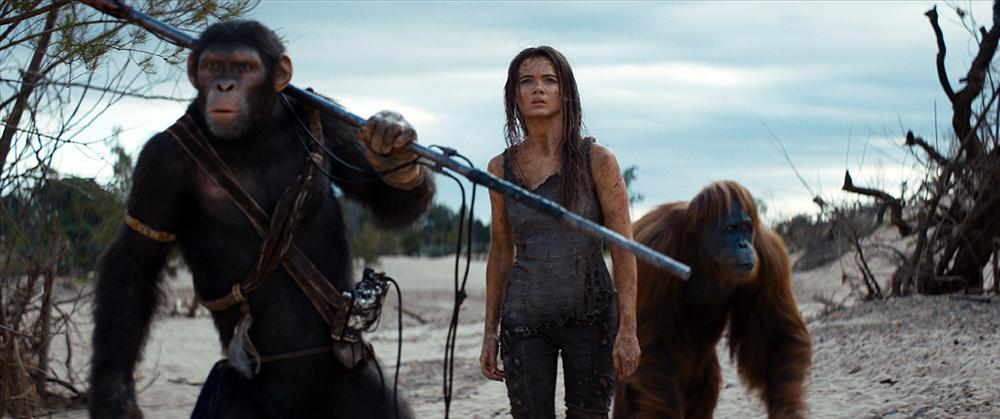When French writer Pierre Boulle wrote La Panéte des singes in 1963, it was meant as a wry commentary on human hubris. His most successful book to date was a war story which was adapted by director David Lean as The Bridge on the River Kwai. Boulle, who didn’t speak English, won the Best Adapted Screenplay Oscar in 1957. His novel, which was translated in the UK as Monkey Planet, became an unexpected hit in England, and was promptly optioned by 20th Century Fox. Boulle thought the book was unfilmable, so he was shocked when Planet of the Apes became a huge hit in 1968. At the Academy Awards that year, Planet of the Apes beat 2001: A Space Odyssey for Best Costume Design. (Legend has it that many Academy voters chose PotA because they thought Kubrick had used real apes in 2001’s “Dawn of Man” sequence.)
The enduring vision of Boulle’s premise has echoed across the decades, with five films and two television series in the 20th century and, beginning with a Tim Burton-directed remake in 2001, for films in this century. In this future world, the humans, who have lost the power of speech and reason, live in captivity and servitude to a society of primates. Gorillas are the warrior class, orangutans are the priestly class, and chimpanzees are scientists.
The last three PotA films, beginning with Rise of the Planet of the Apes in 2011, tell the story of how our world got that way. A medical test chimp named Caesar (Andy Serkis) is infected with an experimental virus, designed to treat Alzheimer’s disease, that increases his intelligence. But when the virus escapes from the lab, it has the opposite effect on humans, and a global pandemic ensues which threatens the existence of humanity. Cloverfield director Matt Reeves helmed Dawn of the Planet of the Apes and War for the Planet of the Apes, drawing a long and complex portrait of Caesar as a wise leader of his people — uh, apes — while a crippled humanity fights for survival. Reeves evolved a patient, detailed style, which proved to be perfect for this version of PotA, but turned positively turgid when he took on the superhero genre in The Batman.
Wes Ball of Maze Runner fame took over for the latest film, Kingdom of the Planet of the Apes, which picks up the story many generations after the death of Caesar. Noa (Owen Teague) is the son of the chief of Eagle Clan, a group of chimps who live in harmony with nature. When he leads an expedition to gather new falcon eggs to raise in the village aviary, he strays into the forbidden Valley Beyond. When he returns, he is followed by a group of masked gorillas armed with electric lances. Eagle Clan, having never seen electricity before, is quickly overwhelmed by the raiders and kidnapped for parts unknown. Noa escapes and sets out to find his stolen tribe. Along the way, he meets Raka (Peter Macon), an orangutan who belongs to The Order of Caesar, a monastic order dedicated to their namesake’s two moral laws: Apes Together Strong, and Ape No Kill Ape. Together, they discover Mae (Freya Allan), a human who, they soon learn, can talk. They track the mysterious raiders until they are ambushed on a bridge and dragged back to an armed camp on the shoreline. There, Proximus Caesar (Kevin Durand) is trying to break through a huge vault door set in the side of a sea cliff. He believes there is game-changing human technology behind the door, and that Mae knows how to open it.
Kingdom is a much more conventional sci-fi adventure story than Reeves’ meditations on the responsibilities of leadership. Its sweeping vistas of Los Angeles in ruins make for some compelling cinema, and Ball knows how to concoct a good slam-bang action sequence. Unlike the old days of Roddy McDowall emoting behind a thick mask, these apes are all motion-capture CGI creations, which sometimes causes confusion, as Noa’s chimp brethren all kinda look alike. Teague’s Noa makes a serviceable and pleasingly vulnerable hero, but he can’t live up to the masterful mo-cap performance of Andy Serkis. Sure, it’s blander than its predecessors, but taken on its own terms, Kingdom of the Planet of the Apes remains a fun summer blockbuster.
Kingdom of the Planet of the Apes
Now playing
Multiple locations
